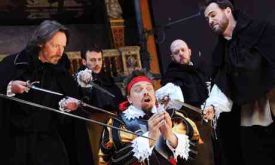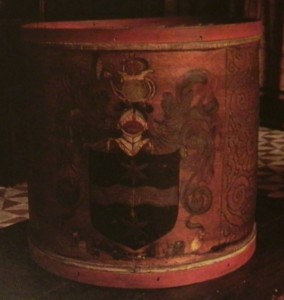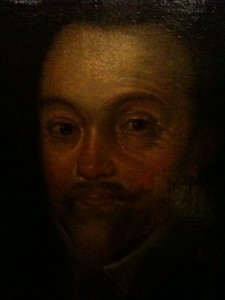All’s Well That Ends Well has recently been described as “one of Shakespeare’s least loved and least performed comedies” (Daily Telegraph) but with current productions at both the Globe Theatre in London and in New York’s Central Park as part of the Shakespeare in the Park season perhaps this complex play is having a bit of a revival.
Attention inevitably focuses on the romantic story which drives the plot, in which Helena eventually successfully wins Bertram, the man she loves. One of the main themes of the play is honour and its relation to virtue. According to Bertram, his ring is
an honour ‘longing to our house,
Bequeathed down from many ancestors
Which were the greatest obloquy I’th’world
In me to lose.
At the same time, the nobly-born Bertram lacks virtue. Helena has this virtue, but is it enough to make her an equal to Bertram?
The play is, though, far more than just a romance. The subplot involving Bertram’s friend Parolles is entirely invented by Shakespeare, so we can assume he chose it with some care. That “most courteous feather”, a braggart and coward, Parolles can be seen as either a figure of warm comedy or a disreputable, obnoxious corrupter of youth.
What is Parolles doing in this play? He has some involvement in the romantic plot, but he is there mostly to open up the discussion of military honour. Parolles and Bertram leave France to fight in wars in Italy. The French soldiers lose their drum, and Shakespeare constructs a story by which Parolles lets down not just himself but all his friends.
In any discussion of the play, including production reviews, this is always passed over almost without comment. Yet it takes up a significant amount of the second half of the play and the exposing of Parolles is essential to the ongoing education of Bertram.
What does the drum stand for? Drums are the main musical instrument used in modern military display, but historically they would have been a symbol and rallying point as we now rally round a flag and national anthem. When the French drum is taken, it’s far more than a drum.
A drum that exemplifies this symbolic importance is Drake’s Drum. Emblazoned with Sir Francis Drake’s coat of arms, it is supposed to have been on board Drake’s ship when he circumnavigated the globe between 1577 and 1580 (the first Englishman to do so), and to have been with him on the voyage to the Caribbean in 1595-6, during which he died. Following his death the drum was brought back to Drake’s house, Buckland Abbey in Devon, where it is still on display.
Drake was the ultimate Elizabethan self-made man. Like Shakespeare he came from fairly humble origins, his family being yeoman farmers. His coat of arms bears the motto “Sic parvis magna” or “great achievements from small beginnings”, reminiscent of Shakespeare’s own motto “not without right”.
Drake became one of the greatest adventurers of his time. The Spanish rated him as a pirate and he certainly didn’t play by any rules. He brought great wealth back to England, in exchange for which he was rewarded with money and a knighthood. A charismatic figure, his exploits made him a figure of myth, and the drum became a powerful symbol. Did Shakespeare know about the story of the drum?
The first half of the play repeatedly harks back to a past in which honour and virtue went hand in hand. It seems to ask the question of how a younger generation can make their own mark while at the same time retaining what was best about the past. Helena links knowledge of the past, her father’s medical skills, with her own ambition for the future, and Bertram is a young man seduced by the glamour of the new who eventually learns to respect and honour the past.
It’s a play rich in myth, legend and tradition. Would the mention of the drum raise memories of Drake, the man who proved that achievement and reputation had nothing to do with birth?





Just thought you should know, you are doing a fabulous job. 🙂
Thank you. So are you!
I caught Jonathan Bate on ‘Start the Week’ yesterday talking about his new play with Simon Callow based on Shakespeare and using the Seven Ages speech to consider Shakespeare’s life. He seems convinced that the many references to soldiers and fighting throughout the plays must mean that some at least of the Lost Years were spent by Shakespeare as a soldier. I’m deeply unconvinced by this, given that there were so many soldiers and ex-soldiers around during the late 16th century and, as with so many other aspects of his work, it is clear that Shakespeare loved acquiring and absorbing information.
With regard to honour, of course the classic anti-argument is Falstaff at Shrewsbury which might be taken to indicate that it was written by a man experienced in and weary of fighting, or just one blessed with immense cynicism or common sense.
Thanks for this comment Mairi, there may be a blog on this subject coming up! Regarding the comparison with Falstaff, Parolles is often regarded as a sort of junior Falstaff.
Sylvia, I think I’m right in saying, aren’t I, that Drake’s drum was at the launch of the National Lottery in 1994 together with one of the Shakespeare Birthplace Trust’s First Folios (the copy known as the Ashburnham), both being present as national icons.
SBT’s Folio certainly was, and was the million pound item. I can’t remember what the other items were though I remember Gladstone’s walking stick. I hope you’re right!